-
Title
-
Philippines
-
Issue Date
-
Volume III (Issue No. 5) July 31, 1943
-
Publisher
-
Commonwealth of the Philippines
-
Year
-
1943
-
Language
-
English
-
Tagalog
-
Ilocano
-
Subject
-
Philippines--History--Periodicals.
-
Philippines--History--19th century--Periodicals.
-
Philippines—Foreign relations--United States--Periodicals.
-
Philippines--Politics and government--Periodicals.
-
Rights
-

-
Place of publication
-
Washington, D. C.
-
extracted text
-
BEFORE BATAAN AND AFTER. By Frederic S. Marquardt. Indianapolis. Bohhs-Merrill Company, 194x 315 pp. ’’ HEN Japan invaded the Philippines, something hap pened which was unparalleled in the Orient and in the history of colonial government. While the subject peoples of the neighboring countries did not fight nor resist the invader, in the Philippines the Filipinos rose as one man in defense of American sovereignty and the American flag, and fought the enemy to the bitter end in what is now known as the epic of Bataan. Many reasons have been advanced for this record performance. In fighting for the American flag, the Filipinos were also fighting for their own country and their own freedom. They were loyal to America because America had won their undying friend ship and affection. But this friendship certainly did not mushroom overnight. Behind it is a long story—a unique experiment in human relationships and government col laboration untried elsewhere in the history of the world. Before Bataan and After tells that story from a person alized viewpoint. In its fine presentation of PhihppineAmerican relationships, it explains the epic of Bataan. Mr. Marquardt’s thesis is that the American experiment in the Philippines paid high dividends when the final rest came in Bataan. Only an author with a fine perspective of contemporary Philippine history could hsre immodiMdy sensed such significance in the Philippine campaign. Mr. Marquardt was born in the Philippines; his parents were among the first American teachers to inaugurate the socalled Philippine experiment. As pioneer teachers, the older Marquardts came on the Sheridan, arriving in the Philippines two months ahead of the famous Thomas, considered the Mayflower of American teachers in the Philippines, which reached Manila on August 23, 1901. Young Marquardt spent his boyhood in the Philippines, got his education in this country, and returned to the islands to make his home. From 1928 to 1941 he was associate editor of the Philippines Free Press, a position which gave him excellent opportunities to view from the front seat the kaleidoscope of events in the Philippines and co mmingle with the participants both high and low. Luck ily-, when the war broke out, he was on vacation in this co untry. Of course, in any personalized account such as this, ex tending over four decades of contemporary history, involvin g a number of personalities, many of whom are still lining, and written at a considerable and forced distance fr-om the setting where the basic materials are to be found, a number of slips are likely to be made, obviously not beGLuse of ill intentions but because of natural limitations sv^cb as rhe difficulty of getting access to all the facts, particruiariy at a time like the present. Thus, it has come to imy attention recently that among other things, it should be noted that Teodoro Kalaw was the third member on (Quezon’s trip to Russia, not Ramon Avanex mi ( page 71 ); L leutenant Miller, commander of the garrison at Mnriveeles, received Quezon's surrender not Roy Squires (page 2 11). Elsewhere some statements assume rhe form of w hat properly may be called versions They n.imr dly call ft ir rhe other side <4 the story before rhe, be a^epted a=5 final. Thus, for example Justue Trank Murphv the k»st governor-general and the first h;-di tommtssinner. is p ictured as having btco bidh Lmbasrcd bi Amr.Tn.jns jznd Filipinos alike when he left rhe Philippines (pages 1 80-181 i While it is true th.it he lul .ktrunts. rhe F ihpino people through their leaders luxe never lost faith in him and they stdl regard him with respect and affection a nd as one of the best friends rhc\ haw cwr had Then, tc )O. in the matter of endian defense for the Philippines, [^resident Quezon is shown as having wanted co leave the KJ S.RT? 21?I. Other sidelights of the story, however, would point to the o ther direction. President Quezon was for organizing c ivilian defense, and bis insistence on this point, as the a uthor correctly surmises, brought about one of those ocC asions where rhe charge of dictatorship was levelled a gainst him. These details, however, do not detract at all f rom the intrinsic value of the book which remains so f ar the best explanation of what happened on Bataan. Projecting the Philippine experiment as a pattern in postwar planning for the rehabilitation of all colonial pos sessions in the Pacific, though likely to meet with opposit ion in its practical details, should nevertheless merit seri ous consideration, especially at this time when human walues, above all things, are at a premium. —S.V.A. Selected Current Literature Books and Pamphlets j The People’s Peace; by representatives of the United Nations. New York, George W. Stewart, Publisher, Inc., c!943. 271 pp. $2*50. (The Philippines is represented by a state ment from President Quezon and an address by Resident Commissioner Elizalde on "The Meaning of a Pacific Charter”.) , . , _ 2 Philippines (Commonwealth). Commission of the Census. ’ Census of the Philippines: 1939- Volume IV—Reports fTXnomic Census. Washington, D. G, 1943. 678 pp. $6.00 postpaid. a United Nations Information Office, N. Y. War and Peace Aims* extracts from statements of United Nations leaders. New York, U.N.J.O., 1943. 136 pp. 25c. July 20, 1943 Periodical Literature 1. American Library Association. The United Nations; a bib liography. The Booklist, June 1943, v. 39, no. 18, part II, pp. 398-417. 2. Kcyne-Gordon, Philip. The Lesson of Corregidor. (Comdensed from a broadcast over the Mutual Broadcasting System). Newsdigest, June 15,1943, v. 2, no. 9, pp. 77-78. 3. Os men a, Sergio. The United States (should be "United Nations”) and the Philippines. (Speech at the annual meeting of the American Academy of Political and Social Science in Philadelphia, on April 10, 1943.) The United Nations Review, May 15, 1943, v. 3, pp. 211-212. 4. Porter, Catherine. Japan’s Blue-print for the Philippines. Far Eastern Survey, May 31, 1943, v. 12, no, 11, pp. 109-112. 5. Quezon, Manuel L. The Pacific Situation. (Statement issued on April 15, 1942) The United Nations Review, May 15, 1943, v. 3, pp. 210-211. 7
HERE AND THERE MacArthur Day On SUNDAY, June 13, Filipinos of Los Angeles, par ticularly soldiers of rhe Filipino Nationals Reserves, ob served the second MacArthur Day, with prayers for the vic tory of rhe General, ar a pontifical high mass in St. Vibiana's Cathedral. The mass was celebrated by Bishop Joseph T. McGucken and presided over by Archbishop John J. Cantwell. The latter gave a papal blessing to the congregation. He said: "It is with unfeigned pride that we salute our Filipino brothers in arms today. . . . General MacArthur has re ferred to the reconquest of the Philippines as our Holy Grail. On those native isles was enacted the full measures of our gallantry—Americans and Filipinos fighting shoul der to shoulder, fighting and dying for all our sanctities. "We are mindful, then, of them in our prayers to the Most Might}’ God: mindful of those who died, of those who linger in prisoners’ chains, of their families and friends. May our quest end soon and may peace come dropping fair upon that lovely land from the merciful hand of God " Spiritual director of the Filipinos was the Rev. John Daly, moderator of the Catholic Filipino Association of America. ☆ ☆ ☆ Missing Reported missing in the European theater of opera tion is Tech. Sergt. Simon E. Alojado, who joined the Air Corps shortly after the fall of the Philippines. His brother, Manuel E. Alojado of Washington, D. C. is employed in the film production section of the War Department. Sergt. Alojado was born in Antique. He studied in Philippine public schools before coming to the United States six years ago. He was noted for his ability in mathe matics in his student days at Northwestern University in Chicago. He was also a champion chess player. He com pleted his training as Flying Fortress crew chief at Kearney, Nebraska, and left for overseas duty last March. ☆ ☆ ☆ Vice-President Osmena Praises Gallantry of Chinese People On the sixth anniversary of the Japanese invasion of China, Vice-President Sergio Osmena issued the following statement in tribute to "the bravery, tenacity, heroism and spirit of sacrifice of the great Chinese people”: "On the sixth anniversary of China’s fight against Japan, the sympathy and admiration of the Filipino people go out to the valiant Chinese people. We who have also faced the fury of Japanese aggression with little more than bare fists appreciate fully how indomitable must be the will, how strong the faith, and how true the courage of the Facts on the Philippines The POPULATION of the Philippines (18,000,000) is greater than that of any country in the Western Hemi sphere, except the United States, Brazil and Mexico. Its land area (115,600 square miles) is greater than that of the British Isles. The printing shop of Santo Tomas University, in Manila, is the oldest in the world today. It has been under the same management since early in the 17th Century. Filipinos settled in Amenta around 1 “10. They arrived m Louisiana, and were known as Malays, but their de scendants today still claim to be Filipinos. One of their settlements, not far from New Orleans, has Jong been known as Manila Village. The Philippines, after discovery by Ferdinand Magellan in 1521, was known as Islas del Pomente ' Islands of the West). In 1 VH, the archipelago was renamed Islas Pili pinas (Philippine Islands; in honor of rhe Spanish crown prince who Liter became King Philip II In PHY when the Philippine Commonwealth conceit« n v..is adopted the official name became simply the Phd ppmus The first school establishes.! by rhe Ann ru .ins in the Philippines was opened on Corrcgidor Island less dim oik month after the victory of ( ommodon George Dewey over the Spanish Fleet. The Philippine flag was turned upside down on Decern bur 8, 19 U, when the Japanese attacked By law, the ilag is flown with the blue on top in time of peace, and the red in time of war. More Filipinos were killed in the Battle of Bataan alone than the total of Americans killed on all fronts—land, sea and air—everywhere in the world during the first year and a half since Pearl Harbor As a guerrilla officer during the Philippine insurrection, Manuel L. Quezon finally surrendered to General Arthur MacArthur on rhe peninsula of Bataan. More than forty years later, as President of the Philippines, Quezon led the Filipino people through the bitter fighting on Bataan by rhe side of Arthur MacArthur’s son—General Douglas MacArthur. Chinese people. Through six long years of painful and arduous struggle, they have carried on admirably amidst dispiriting handicaps and against formidable odds. They have proved that no sacrifice is too great for the sake of liberty, freedom and democracy. More than this, from the ashes of each bloody setback, the Chinese people have risen stronger, more resolute and more united than ever. "Today, the Filipino people join all freedom-loving na tions in saluting the bravery, tenacity, heroism and spirit of sacrifice of the great Chinese people. Just as we are bound together in the fight against the common enemy, so do we look forward with faith and confidence to the time when the Chinese and Filipino peoples will work together in the peace that will follow the victory of the United Nations.” 6 Philippines
MacArthur Day On SUNDAY, June 13, Filipinos of Los Angeles, par ticularly soldiers of rhe Filipino Nationals Reserves, ob served the second MacArthur Day, with prayers for the vic tory of rhe General, ar a pontifical high mass in St. Vibiana's Cathedral. The mass was celebrated by Bishop Joseph T. McGucken and presided over by Archbishop John J. Cantwell. The latter gave a papal blessing to the congregation. He said: "It is with unfeigned pride that we salute our Filipino brothers in arms today. . . . General MacArthur has re ferred to the reconquest of the Philippines as our Holy Grail. On those native isles was enacted the full measures of our gallantry—Americans and Filipinos fighting shoul der to shoulder, fighting and dying for all our sanctities. "We are mindful, then, of them in our prayers to the Most Might}’ God: mindful of those who died, of those who linger in prisoners’ chains, of their families and friends. May our quest end soon and may peace come dropping fair upon that lovely land from the merciful hand of God " Spiritual director of the Filipinos was the Rev. John Daly, moderator of the Catholic Filipino Association of America. 6
“NEWS” from the PHILIPPINES LEAS and threats broadcast by Tokyo for over a year have unwittingly told the world a story of unending re sistance by unconquered Filipino and American soldiers against the Japanese invaders of the Philippines. On Jul}- 2. 1943, in what amounted virtually to a battle communique. the Japanese reported on the operations against Filipino forces on the island of Cebu. This state ment declared that the Japanese forces, "since the start of operations in Northern Cebu March 10, haxe been de fying ever}’ hardship in the achievement of the pacification campaign and on the night of June 1 \ the unit com mander. accompanied by members of his unit, launched a surprise thrust on the bandit headquarters and freed three native prisoners and captured four of the enemy, as well as a quantity of munitions.” .On many occasions since the fall of Corregidor, the Jap anese have announced the complete pacification" of the Philippines. But they continue to report the surrender of groups of "guerrillas” and "bandits.” as the enemy calls the Americans and Filipinos who refuse to submit to Nippon’s new order. The Japanese propaganda machine plays up to the limit stories of the "surrenders,” giving names and ranks of captured leaders and quoting statements purport ( Continued from page 3 ) that rhe results exceeded all expectation. In the first place, the first meeting of al! the United Nations had removed all doubt that these nations can really work together, at least on some subjects. Although it is true that controversial subjects were in rhe main avoided, it is also true that dele gates discussed each other’s problems with understanding and sympathy. Contacts were eagerly sought and made, friendships established, coasts drunk to the next meeting. Out of the conference arose the first formal organiza tion and secretariat of the United Nations. An Interim Commission has been established in Washington to which edly made by them about the kindness and courtesy ex tended to them by Japanese military authorities. By Japanese ADMISSION, Filipino "guerillas” and "ban dits” have been destroying communication lines and store houses and distributing anti-Japanese handbills. Oftentimes they engage the Japanese in bloody skirmishes. Here are some of rhe contradicting items spewed by the enemy radio On April 2, 19-i2, a week before the fall of Bataan. Tokyo confidently announced "complete restoration of peace and order on Luzon." On May i. 19i2. shortly be fore (orrvgtdor’s capitulation. Tokyo admitted th.it "thcc leaning-up campaign is continuing on Luzon and accused Filipino-American forces »>f sacking raping, setting build ings on tire jnJ llvcmg mio the hiJJ^ ’ On June 2S. 19 i2. Tok\o stated that 1 ilipinos could be made men of good cliarac ter if they cooperated with (he Japanese' Onh four da\s before, the Japanese had an nounced the execution of eight Filipinos tor distributing ami-Japanese pamphlets on da\ of ,d| days’ rhe Emperor's birthda} On November \ 1'MJ. h>ko> agon admired that Japan liad been Juried to send .in 1 xpiJ;: ;' >n m the last stronghold's of resistance m die ( -no 'sl.mds On Match 19, 19H. the Japanese-^.<n:t .k 1 M..mla tJ... ..died for the ’ pacification <>f Mindanao The Japanese have pr. •tmsed mdc p< mk m c t<<r the Philippines this \ear bm <aik '<n n-ndah n -»i.< peace and order reign throughout the i«nmm .ill die countries represented luu xenc rcprovm.uixex This Interim Commission. which has dread'. mcr. will draft the detailed organization of a permanent organiza tion to carry out the recommendations of the ( onterence. Acting for the President, who was awav on a vacation. Vice-President Osmeha designated Joaquin M. Elizalde, Resident Commissioner, co represent the Philippines on the Interim Commission. The first conference of the United Nations had started the ball rolling Other conferences are already scheduled; relief and rehabilitation, trade and commerce, mineral resources, are topics that may soon be the subject of dis cussion by the United Nations. PHILIPPINES is published by the Govern ment of the Commonwealth of the Philippines. Filipinos who desire to receive it regularly are requested to notify: The Editor, PHILIPPINES 1617 Massachusetts Avenue, N. W., Washington 6, D. C. Sec. 562, P.L&R. U. S. POSTAGE PAID WASHINGTON, D. C. PERMIT No. 5045 POSTMASTER—If undeliverable FOR ANY REASON, notify sender, stating reason, on FORM 3547, postage for which is guar anteed. 8 Philippines
Niconicdes Suller On DECEMBER 25, 19-41. when a heavily armed Japanesc contingent, supported by tanks, reached San Manuel, an inland town in Pangasinan, Nicomedcs Suller, mayor of the town, tried to stop the invaders. He stood in the middle of the highway, a pistol in his hand and shouted frantically .d the men. begging them to spare the town but they paid no attention to him; and the tanks rolled on, drowning the thump of marching feet. This enemy unit was part of a main body of Japanese troops which landed off the gulf of Lingaycn earlier in rhe month, and was now pushing its way relentlessly to the south. The town of San Manuel lay on its path. And on Christmas eve, the troops had reached rhe gates of the town, expecting no resistance. Under the circumstances, resist ance was more than futile. It was suicidal. Mayor Suller was aware of this. That was why he begged the men nor to go on, for wherever they went, they left destruction in their wake. San Manuel was but a little town of less than 16,000 inhabitants, typical Filipinos, God fearing and peace-loving. They earned their living, toiling daily on their farms, selling their produce at the market places, minding their own business, pursuing rhe even tenor of their ways with the pastoral simplicity characteristic of Philippine villages. As mayor, Suller had served them well, defending and protecting the interests of the town popu lace. This was his sworn duty, and he had never proved recreant to the trust reposed on him by the electorate. He would not be recreant now. That was what he was trying to do. That was what he wanted these men to see. But they spoke a different language, those men. That was why Suller was forced to talk to them in the only language they understood—buffers, although Suffer knew that by doing this, he was going to pay with his life. He rushed recklessly to the nearest tank, board ed it, and emptied his gun through the porthole of the tank. There were quick, answering shots, and the mayors body, riddled with bullets, fell on the wayside not far from the municipal building of the town. The young man died protesting. It was a simple protest. "You should not come nere, because we do not want you.” It was as simple as the faith he held in the country he loved, and as steadfast, and so powerful he was willing to die for it. It was as simple as the man himself. "Nick,” as he was popularly called, belonged to the masses. His parents were poor, but honest and hard-work ing. They worked hard to send their boy to the public schools, where he developed a love for the common man, for justice. Whenever a question arose, in which individual rights were involved, he always asked, "Where’s justice in that?” In school he learned that there were things more price less than life itself; that there were things worth dying for, like freedom against tyranny and oppression, and jus tice for all. For these things he worked in his humble capacity as mayor of San Manuel. For these things he gave his life on that Christmas Day two years ago—an offering on the altar of freedom. Everybody loved "Nick” for his integrity, for his cour age to stand for the right. And surely it was not right for anybody to go marching through your town, getting at your vital provisions, destroying those who resist. "Where is justice in that?” That was what he was saying when they killed him. This was the theme of his life of service as a public servant. He wanted justice meted out to all. He wanted justice for San Manuel. Justice for the Philippines. He was a young man when he died; he was in his middle thirties like Jose Rizal. Like Rizal, he preferred death to slavery. A wife' and two children survivfe ’ him. No citation has been awarded to Suller. No medal of honor has been given posthumously to his wife for her to show to her children sometime in the future when they are old enough to under stand. But better than a citation is the loving reverence of the inhabitants of San Manuel, of the whole Filipino people who now live under the shadow of the conqueror, silently waiting for that day when the heroic dead like Suller, shall have been finally and fully avenged. July 20, 1943 3
PHILIPPINE PLEDGES TO ALLIED VICTORY These two Filipino officers, standing against a back ground of the symbolic poster, "The Fighting Filipinos" were among the 1943 graduates at West Point. On the right is Lt. Eduardo T. Suatengco, and on the left is Lt. Rafael M. Ueto. Suatengco ranked 72nd in a class of 514 (largest in West Point history), and Ueto 76th. They will attend a threemonth course at the Infantry School in Fort Benning. Georgia, before proceeding to the First Filipino Infantry’ in California. Both attended the college of engineering of the Uni versity of the Philippines before entering the Philippine Military Academy in Baguio. They were appointed cadets in the United States Military Academy in 1940. Suatengco and Ueto were popular at West Point. Tall and slender, they were good athletes. Ueto, the taller of the two, was on the varsity lacrosse team. Suatengco was an academic coach, helping his classmates in mathematics, a subject in which both officers excelled. They are also rifle experts. Ueto was a cadet lieutenant, and Suatengco, a cadet sergeant. The "Howitzer,” West Point yearbook, says of Suatengco: "Full of ingenuity', resourcefulness and mechanical aptitude, Ed’s neatness and punctuality made him a good friend of the Tactical Department. A potential starman, academics never bothered him, although he found heart problems hard to solve. Having come to West Point from the Philippine Military Academy, Ed is bound for the Hall of Fame." Of Hero, the "Howitzer” says: "Ralph came to West Point after a hard plebe year at the Philippine Military Academy. Starting as a ’recognized plebe1 he showed his soldiery qualities by wearing chevrons throughout his up perclass years. A natural hive, he ranked high in spite of his troubles with the English Department. Although his ambition is to raise a big family, he first intends to do his share by rearing a big army.” Suatengco is a native of Bulacan. Ueto hails from Nueva Ecija. Both are anxious to carry on in the spirit of the de fenders of Bataan and Corregidor. 4 Philippines
Philippines PUBLISHED BY THE COMMON WEALTH OF THE PHILIPPINES 1617 MASSACHUSETTS AVENUE, N. W., WASHINGTON 6, D. C. Volume III, Number 5 July 31, 1943 Fifth Annual Inter-Community Convention Pledges Cooperation With Philippine Government Post-War Reconstruction Program More effective participation of Filipinos in the United States in the war effort and in the building up of a new Philippines is the keynote of a four-day convention of the Fifth Filipino Inter-Communit}' Organization of the West ern States, held from July 1 to 4, in Stockton, California. About two hundred delegates and alternates from thirtyfive Filipino communities of the Pacific Coast attended the convention. The Commonwealth government at Washing ton was represented by Manuel A. Adeva, Nationals Divi sion Assistant to the Philippine Resident Commissioner and Field Representatives of the Western Division, Dr. Jose F. Imperial and Dr. Roman Ubaldo. Mr. Adeva attended the convention as the personal rep resentative of Commissioner J. M. Elizalde, who was un able to accept the invitation to be guest of honor because of the pressure of his official duties in Washington. The delegates pledged full cooperation with the Philip pine government’s post-war reconstruction program of the Philippines. The principal feature of the convention consisted of timely surveys on various Filipino problems. Problems of Filipino labor was discussed by Jose de los Reyes. The Rev. Casiano Coloma, Pastor of the Filipino Christian Church of Los Angeles read a paper on Filipino social prob lems while Rev. Geo. Garcia, Pastor of the Trinity Presby terian Church at Stockton, read a paper on religion and the Filipino. The editor of the Philippines Star Press, Amado E. Dino, spoke on the role of Filipino newspapers. Labor leader Pedro Algas gave a talk on Filipino labor movement. President Melecio Dellota of the Filipino Com munity of Los Angeles discussed Filipinos in war and in peace. In the course of the convention, various committees were organized to draw up practical plans on different aspects of the principal aim of the convention—more effective par ticipation of Filipinos in the United States in the war ef fort and in the building up of a new Philippines. The Com mittee on post-war reconstruction is composed of one delegate from each community. Other committees had to do with problems of Filipino labor, Filipinos in the war effort, social problems, and Filipino farming problems. CONGRATULATORY messages .uhl greetings from high ranking Philippine officials and community leaders were read during the convention. From his summer camp, President Quezon wired: T wish I could be with you, but I am temporarily confined in bed. Although I cannot be with you in person my heart and mind are with you. I wish you success.” One minute of silence was dedicated in prayer for the speedy recovery of the President. Vice-President Osmena sent a telegram which was also lead to the delegates. The telegram read: "My best wishes go to the delegates attending the Fifth Annual Convention of the Filipino Inter-Community Or ganization of the Western States in Stockron. Tn these crucial days, as the war enters its decisive phase, unity and cooperation among Filipinos everywhere is im perative if the nation is to emerge unshaken from the heavy ordeal that lies ahead. Thus, ever}’ Filipino is ex pected to contribute his utmost with a full heart, until final victory is achieved. "1 know that you, who represent thousands of our coun trymen in the United States, will never falter in your duty —that you will help to win real freedom and happiness for our own country. Your meeting is most opportune: your efforts to find ways and means of making your contri bution to the war effort more effective are commendable: and I have abiding faith that your patriotic labors will not be in vain. "To you, therefore, I send this message of encourage ment and appreciation: Continue your spirit of cooperation and sacrifice. Remain true to the ideals of democracy and freedom. Never faker in this struggle which, with God’s blessing, will bring genuine independence to our beloved Philippines." Resident Commissioner Elizalde, sounding the keynote of the convention, relayed this message: "Cordial greeting to you all, and sincere thanks to your President for his kind invitation to me to join you in Stockton as Guest of Honor at this, your Fifth Annual Conven tion. I would have gladly accepted his invitation were it
Philippines Participates in International Conferences Ever since President Quezon established the headquar ters of the Commonwealth Government in Washington, the Philippines has been invited to the most important international conferences held here in the United States. In all of them, Philippine delegates participate in the pro ceedings as representatives of a sovereign nation. Invariably, the presence of Philippine representatives arouses great interest in these gatherings. People who have never before heard of the Philippines now want full in formation on its geography, political history and economic development. Philippine delegates are frequently asked to read papers on Philippine topics and their audiences al ways seem to want more. Beyond doubt, interest in the country has never before been so high as it is now. When the Filipino and American soldiers made their sacrificial stand on Bataan and Corregidor, they held, for an unfor gettable moment, the concentrated attention of the world. That interest has remained at a high pitch, as indicated by the great number of current books about the Philip pines and the popularity of the Philippines as a subject on the lecture platform. The world eagerly awaits the sequel to Bataan and Corregidor. Some of these conferences are informal and serve merely as a forum for exchange of opinion and public discussion of vital subjects. Such, for example, was the Conference of the Institute of Pacific Relations held at Mont Tremblant, Canada, in December, 1942. Others are official con sultations between heads of representative governments where high policies are discussed. An outstanding example of this is the Pacific War Council. A list of the meetings, conventions, and conferences in which the Philippines was represented will show how busy Philippine delegates have been. I. Eighth Conference, Institute of Pacific Relations, Mont Tremblant, December 2 to 14, 1942. Delegates: Joaquin M. Elizalde Arturo B. Rotor Urbano A. Zafra Sebastian Ugarte Francis B. Harrison II. Forty-Seventh Annual Meeting of the American Academy of Political and Social Science, Philadelphia, April 9 and 10, 1943. Delegates: Jaime Hernandez Arturo B. Rotor Sotero Laurel Vice-President Osmena was one of the three speakers at the final session. III. International Committee for Cooperative Recon struction, Washington, March 29. 1943. Representative: Urbano A. Zafra IV. United Nations Conference on Food and /Agricul ture, Hot Springs, May 18 to June 3, 1943. Delegates: Joaquin M. Elizalde Arturo B. Rotor Urbano A. Zafra Juan B. Barretto Amando M. Dalisay Basilio J. Valdes Currently taking place are talks between the United States Government and other governments on currency {Continued, on page 5) not for the pressing official duties which require my pres ence in Washington these next few weeks. I sincerely re gret that I am unable to be with you in this important gathering. "I have made arrangements, however, for Mr. Manuel A. Adeva, Nationals Division Assistant, to attend the Con vention as my representative. He is vitally interested not only in the community organizations, but also in all your problems. He will surely assist you in every way possible to insure the success of your deliberations. *'Our country is still in the hands of the enemy and may remain so for many more years. Nevertheless, I have no misgivings as to the final outcome of this war. I sincerely hope that when the time comes for us to be in our own homes and country again, you and I will find ourselves more prepared and better equipped to discharge our re spective responsibilities. Those of us in the United States can and should play an important parr in the post-war reconstruction period of the Philippines. "I trust that you will consider seriously in your meet ings, not only how best you can help win the war, but also how effectively you can contribute to the building up of a new Philippines." On the last day of the convention, a memorial service was held in memory of the late Francisco Varona, who as Nationals Division Assistant to the Philippine Resident Commissioner, fathered the idea of Filipino conventions attended by delegates from different parts of the Pacific Coast. The First Filipino Inter-Community Convention was held in Sacramento in 1938. It resulted in the creation of the Nationals Division of the Philippine Commissioner’s Office. This division has supervision over the affairs of Filipinos in the United States and Hawaii. The Organization is composed of the organized Filipino communities in Arizona, California, Oregon, and Washing ton. These community organizations are officially recog nized by the Office of the Philippine Resident Commis sioner in Washington, which keeps in touch with them on matters relating to Filipino nationals. On the last day of the convention, Antonio A. Gonzalez was reelected president. A similar convention is scheduled next year. 2 Philippines
{Continued ^rom page 2) stabilization. These bilateral and group discussions are designed to prepare the ground for a more formal United Nations conference on the subject. No definite date has been set for this, but it is understood the conference will be called in a few months. Colonel Andres Soriano, as Secretary of Finance, represented the Philippines in these talks; his advisers are Jaime Hernandez, Auditor General; Mr. Joseph H. Foley, manager of the New York Agency of the Philippine National Bank; and Mr. George F. Luthringer. Quite different was the Conference on Food and Agri culture, which was held at Hot Springs, Virginia, from May 18 to June 5, 1945- This, the first formal meeting of (he United Nations, opened amidst pessimistic prophecies. For a long time the need was felt to implement the ideas expressed in the zVtlantic Charter and the Four Freedoms with concrete action. The concept of the United Nations was still on paper; there was no secretariat, no post office address, no telephone number, for the United Nations. Suddenly, one day, it was announced that the United States had invited the United Nations and their friends to attend a conference on food and agriculture. Why food and agriculture? For many reasons. Food was essential in winning the war; food was one of the primary needs of man; and food as a subject for discussion seemed free enough of those controversial implications that might wreck the United Nations even before they had a chance to organize. To Hot Springs, Virginia, went the delegations of fortylive nations which differed in size from that of Greece and Iraq, which had one member each, to that of Brazil and China, which had ten. The composition of each delega tion varied, but there was a preponderance of economists, public health experts and commercial and financial officials. Tribute to President Quezon JuSTICE Frank Murphy of the Supreme Court of the United States, who from 1933 to 1935 was the last Gover nor-General of the Philippines and from November, 1935 to December, 1936 was its first High Commissioner, paid the following tribute to President Manuel L. Quezon on the anniversary of his arrival in the United States: "Just one year ago, President Quezon, you arrived in the United States to help direct from this free soil the destinies of your people in the Philippines. The physical dangers of the trip had been many and great, but they were as nothing to the spiritual travails you had undergone in leav ing your people. "Three choices were before you after the fall of Pearl Harbor. One was to become a Quisling. The lavishments of Japan for years had been futile in the face of your loy alty, for you are first a patriot. Even at Corregidor Japan made advances to you, thinking naively that you could be tempted from your unswerving honor. That choice was, of course, unthinkable for you. "The second was to remain close to your people, defend ing and protecting them with your last breath. This was An indication of how important the different countries considered the meeting was the fact that each delegation was often headed by an ambassador or minister. There were eight ministers and six ambassadors present; many others had cabinet rank. It was an open secret that many considered the conference a dress rehearsal for the peace conference. From opening to closing session, the delegates worked hard far into the night. In the first plenary session, the various delegations were introduced. From the applause that followed each introduction one gathered that the sympathies and good wishes of the whole world went first to those nations which had fought best and made the most sacrifices. Thus, burst after burst of handclapping followed introduction of the delegations from China, Ethiopia, France, Russia and the Philippines. The Philippine delegation presented the following pa pers: "A summary of the problem of nutrition in the Philippines” (Section I, Committee 1)—by Dr. Rotor "Exports of specified products in pre-war years” (Section I, Committee 3)— by Dr. Zafra "Agriculture and food situation in the Philip pines”—by Mr. Dalisay "The problem of developing new lands and of conserving cultivated lands in the Philippines” (Section II, Committee 3)—by Mr. Dalisay "Experience of the Philippines”—International Commodity Problems (Section III, Committee 4) —by Dr. Zafra When the final act was approved, embodying the find ings and recommendations of the conference, everyone breathed a sigh of relief. The unanimous opinion was {Continued on page 8) what you really wanted to do, for your heart and soul were and are today in the Philippines. The third choice was to follow the path desired by President Roosevelt, to join him in Washington and to serve actively in the program to oust the Japanese from your country and to bring free dom to your people. "No man’s duty was ever harder than yours. Your heart was heavy, but your faith was high, and so you followed the course of duty to Washington where your energies could best serve your country and your people. "Between them and us exists nothing but good will and harmony. I recall the day in 1935, when you took the oath of office, after your people, exercising their free sufferage, had elected you as the first President of their Common wealth. I listened, in front of the Legislative Building there in Manila to your inspiring inaugural address. You spoke kindly words about the United States, Mr. President. You said the crowd gathered there were witnessing the final stage in the fulfillment of the noblest undertaking ever attempted by any nation in dealing with another people. You said: ‘And how well this task has been performed is attested to by the blessings which from fourteen million people go to America in this solemn hour’.” July 20, 1943 5
Vice-President Osmena Praises Gallantry of Chinese People On the sixth anniversary of the Japanese invasion of China, Vice-President Sergio Osmena issued the following statement in tribute to “the bravery, tenacity, heroism and spirit of sacrifice of the great Chinese people”: “On the sixth anniversary of China’s fight against Japan, the sympathy and admiration of the Filipino people go out to the valiant Chinese people. We who have also faced the fury of Japanese aggression with little more than bare fists appreciate fully how indomitable must be the will, how strong the faith, and how true the courage of the Chinese people. Through six long years of painful and arduous struggle, they have carried on admirably amidst dispiriting handicaps and against formidable odds. They have proved that no sacrifice is too great for the sake of liberty, freedom and democracy. More than this, from the ashes of each bloody setback, the Chinese people have risen stronger, more resolute and more united than ever. "Today, the Filipino people join all freedom-loving na tions in saluting the bravery, tenacity, heroism and spirit of sacrifice of the great Chinese people. Just as we are bound together in the fight against the common enemy, so do we look forward with faith and confidence to the time when the Chinese and Filipino peoples will work together in the peace that will follow the victory of the United Nations.” 6 Philippines
Philippines PUBLISHED BY THE COMMON WEALTH OF THE PHILIPPINES 1617 MASSACHUSETTS AVENUE, N. W., WASHINGTON 6, D. C. Volume III, Number 5 July 31, 1943 Fifth Annual Inter-Community Convention Pledges Cooperation With Philippine Government Post-War Reconstruction Program ]\IoRE effective participation of Filipinos in the United States in the war effort and in the building up of a new Philippines is the keynote of a four-day convention of the Fifth Filipino Inter-Community Organization of the West ern States, held from July 1 to 4, in Stockton, California. About two hundred delegates and alternates from thirtyfive Filipino communities of the Pacific Coast attended the convention. The Commonwealth government at Washing ton was represented by Manuel A. Adeva, Nationals Divi sion Assistant to the Philippine Resident Commissioner and Field Representatives of the Western Division, Dr. Jose F. Imperial and Dr. Roman Ubaldo. Mr. Adeva attended the convention as the personal rep resentative of Commissioner J. M. Elizalde, who was un able to accept the invitation to be guest of honor because of the pressure of his official duties in Washington. The delegates pledged full cooperation with the Philip pine government’s post-war reconstruction program of the Philippines. The principal feature of the convention consisted of timely surveys on various Filipino problems. Problems of Filipino labor was discussed by Jose de los Reyes. The Rev. Casiano Coloma, Pastor of the Filipino Christian Church of Los Angeles read a paper on Filipino social prob lems while Rev. Geo. Garcia, Pastor of the Trinity Presby terian Church at Stockton, read a paper on religion and the Filipino. The editor of the Philippines Star Press, Amado E. Dino, spoke on the role of Filipino newspapers. Labor leader Pedro Algas gave a talk on Filipino labor movement. President Melecio Dellota of the Filipino Com munity of Los Angeles discussed Filipinos in war and in peace. In the course of the convention, various committees were organized to draw up practical plans on different aspects of the principal aim of the convention—more effective par ticipation of Filipinos in the United States in the war ef fort and in the building up of a new Philippines. The Com mittee on post-war reconstruction is composed of one delegate from each community. Other committees had to do with problems of Filipino labor, Filipinos in the war effort, social problems, and Filipino farming problems. ONGRATULATORY messages and greetings from high ranking Philippine officials and community leaders were read during the convention. From his summer camp, President (Quezon wired: 1 wish I could be with you, but I am temporarily confined in bed. Although I cannot be with you in person my heart and mind are with you. I wish you success.” One minute of silence was dedicated in prayer for the speedy recovery of the President. Vice-President Osmena sent a telegram which was also lead to the delegates. The telegram read: "My best wishes go to the delegates attending the Fifth Annual Convention of the Filipino Inter-Community' Or ganization of the Western States in Stockton. Tn these crucial days, as the war enters its decisive phase, unity' and cooperation among Filipinos everywhere is im perative if the nation is to emerge unshaken from the heavy ordeal that lies ahead. Thus, every Filipino is ex pected to contribute his utmost with a full heart, until final victory is achieved. "1 know that you, who represent thousands of our coun trymen in the United States, will never falter in your duty —that you will help to win real freedom and happiness for our own country. Your meeting is most opportune: your efforts to find ways and means of making your contri bution to the war effort more effective are commendable: and I have abiding faith that your patriotic labors will not be in vain. "To you, therefore, I send this message of encourage ment and appreciation: Continue your spirit of cooperation and sacrifice. Remain true to the ideals of democracy and freedom. Never falter in this struggle which, with God’s blessing, will bring genuine independence to our beloved Philippines." Resident Commissioner Elizalde, sounding the keynote of the convention, relayed this message: "Cordial greeting to you all, and sincere thanks to your President for his kind invitation to me to join you in Stockton as Guest of Honor at this, your Fifth Annual Conven tion. I would have gladly accepted his invitation were it
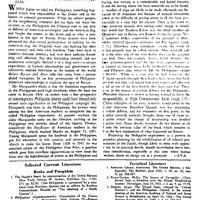 Before Bataan and after
Before Bataan and after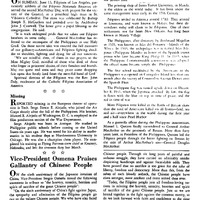 Facts on the Philippines
Facts on the Philippines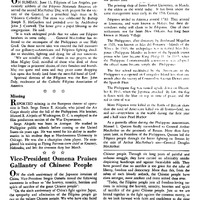 MacArthur Day [column]
MacArthur Day [column]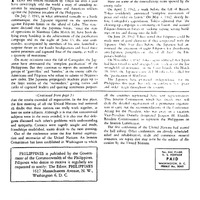 News from the Philippines
News from the Philippines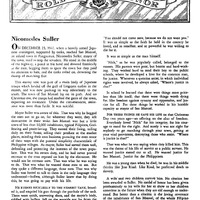 Nicomedes Suller
Nicomedes Suller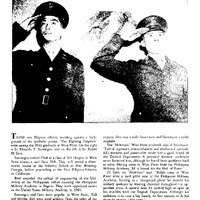 Philippine pledges to allied victory
Philippine pledges to allied victory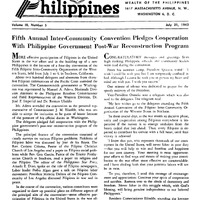 Philippines
Philippines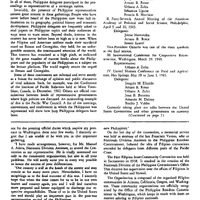 Philippines participates in International Conference
Philippines participates in International Conference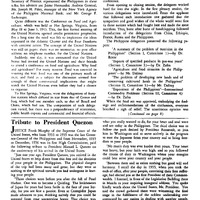 Tribute to President Quezon
Tribute to President Quezon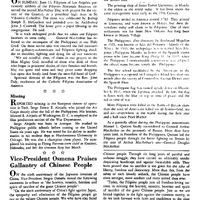 Vice-President Osmena praises gallantry of Chinese people
Vice-President Osmena praises gallantry of Chinese people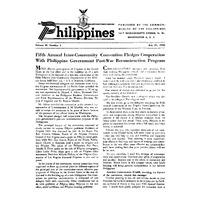 Fifth Annual Inter-Community Convention pledges cooperation with Philippine government post-war reconstruction
Fifth Annual Inter-Community Convention pledges cooperation with Philippine government post-war reconstruction